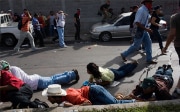
Humanitarian Aid

SDC is a long-term and trusted partner of the Republic of Moldova since 2000, when Switzerland started a humanitarian relief program to help Moldova to deal with the consequences of catastrophic draughts, floods, and severe winter conditions. From the beginning of the Russian military aggression on Ukraine in February 2022, Switzerland has contributed to the refugee response with a focus on cash assistance, health, wash and social protection sector.
Switzerland funds the following projects within the Humanitarian Aid Program in Moldova:
Swiss Government Contribution to National Emergency Fund
Period: March 2022 – December 2022
Budget: 3’000’000 CHF
The aim of the project is to strengthen the capacity of the Government of the Republic of Moldova to cover the costs and necessities related to the response of the Ukrainian refugee crisis. This includes the costs for accommodation, food and basic services, including health care and social assistance, through the existing structures of the Republic of Moldova.
Cash Assistance
Period Phase I: March 2022
Budget: 574’760 MDL ~ 28’394 CHF
Period Phase II: April 2022 – August 2022
Budget: 550’540 MDL ~ 27,197 CHF
The project provided cash assistance to refugee hosting Moldovan families, by helping them to cover the increase of the running costs and by enabling them to upgrade their living standards. Consequently the action improved the living conditions of the hosted refugees.
Moldova: SKAT Sanitary Units for Hosts of Ukrainian Refugees
Period Phase I: May 2022 – December 2022
Budget: 1’550’000 CHF
The project is performing the analysis, house-specific repair or construction works to restore or create an adequate, permanent sanitary facility that fulfils minimum criteria of hygiene, dignity, privacy, accessibility, comfort and environmental protection for households that are hosting refugees. Further, project support a number of Moldovan families that are especially vulnerable.
Capacity-building of health professionals in Emergency Care (Mother/Children)
Period Phase I: May 2022 – December 2022
Budget SDC framework credit: 190’000 CHF
Total Global Budget: 160’000 CHF
Strengthening capacities to address emergency health care services of hospitals in case of mass casualties due to an increased influx of refugees
Period Phase II: August 2022 – December 2022
Budget: 17’100’000 CHF
Co-funded by multiple donors: Japan, Canada, USA, European Commission Swiss Contribution: 1’530’000 CHF
The goal of the project is to enhance the quality emergency care for mothers and children as well as other trauma patients, including refugees from Ukraine. The capacity-building is conducted in in 4 hospitals - rayon hospitals from Stefan Voda, Cuseni, Anenii Noi, Ignatenco Children’s Emergency Hospital consisting of five components:
- Training of Trainers (ToT) at three training centres that teach health professionals in the area of paediatric emergencies.
- Crew Resource Management training with the teams working in the emergency departments of the four hospitals for 3-5 days;
- On-the-job training is provided o pediatricians of the pediatric departments at the work place during one week at each of the four target hospitals.
- Study visit to Geneva University Hospitals and regional hospital for key decision makers of the target hospitals and of the MoH will be organized to learn and witness best international practices in the area of mother and child emergency care.
- Training equipment and materials (manikins and books) will be procured on the local market.
The scope of this project is the procurement of medical equipment for emergency departments and intensive care units of three district hospitals - Stefan Voda, Causeni and Anenii Noi, and paediatric emergency hospital in Chisinau.
Partial Action – Furniture for ASEM Shelter
Period: March 2022 – May 2022
Budget: 4’900 CHF
The project supported the transportation of furniture (beds, matrasses, chairs and metal cupboards) from Zurich to Chisinau, the customs procedure and administrative related costs. The furniture was necessary to create additional accommodation places in two existing state-accredited refugee shelters – the student dormitory of the Academy of Economic Studies of Moldova, Chisinau and the Summer Camp, Vatici village, Orhei district.
Partial Action - Manej renovation
Period: April 2022 – July 2022
Budget: 30’000 CHF
The project supported the renovation of the most affected areas of Manej Sport Center, because the usage of the center as a RAC lead to some damages, especially the polyurethane floor of the main area and the sanitation facilities suffered from over- and improper use.
Partial Action – Accessible transport for refugees
Period: May 2022 – July 2022
Budget: 50’000 CHF
Implementing partner: NGO “Motivatie”
The project’s aim was to offer accessible support services for refugees with disabilities from Ukraine and their families or accompanying persons, through:
- providing accessible transportation from the Moldovan border;
- facilitating accommodation arrangements for the refugees in the appointed governmental shelters;
- providing hygiene and food packages to refugees with disabilities from Ukraine.
Partial Action - Better services for Ukrainian refugees with disabilities
Period: June 2022 – February 2023
Budget: 50’000 CHF
Implementing partner: NGO “Keystone Moldova”
The project supports the extension of the “Keystone Moldova” NGO’s actions and services over incoming Ukrainian refugees with disabilities. They include the following: mapping refugee needs, disability-disaggregated data collection and analysis, responding to training needs of social workers, shelter workers, LPAs etc., participation in coordination mechanisms, running the National Hotline Service, delivery of assistance and aid through the mobile team service.

Fragility, conflicts, violence and human rights violations: these are among the main challenges to poverty reduction. Fragility within a state is characterised by the government’s inability to provide security and basic public services. The SDC works to alleviate the causes of conflict, strengthen basic public services and increase respect for human rights.
